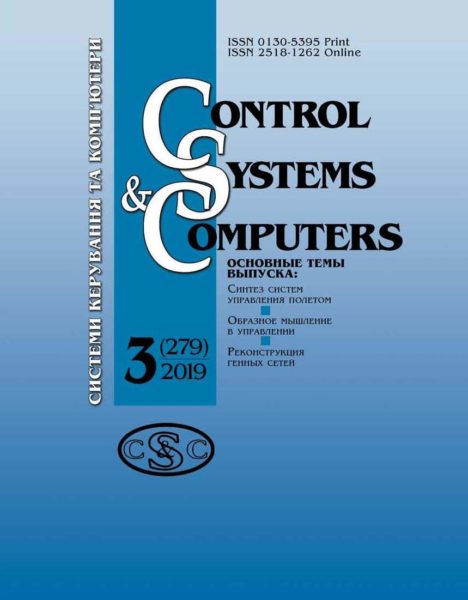Control Systems and Computers, N1, 2021, Article 5
https://doi.org/10.15407/csc.2021.01.048
Control Systems and Computers, 2021, Issue 1 (291), pp. 48-61.
UDC 007:330
V.O. Muzaliova, Chief engineer-programmer, Department of virtual systems,
International Research and Training Centre of Information Technologies and Systems of the NAS and MES of Ukraine, Acad. Glushkov ave., 40, Kyiv, 03187, Ukraine, dep190@irtc.org.ua
N.V. Maidaniuk, PhD student, junior research scientist, International Research and Training Centre of Information Technologies and Systems of the NAS and MES of Ukraine, Glushkov ave., 40, Kyiv, 03680, Ukraine, n.maydanyuk@ukr.net
The digital business model of an industrial enterprise
Introduction. The work is devoted to the transition of an industrial enterprise to electronic platforms, providing for the digitalization of all business processes occurring at the enterprise, the creation of a new business model using modern information, telecommunication and intelligent technologies.
The purpose of the work is to conduct a comparative analysis of traditional business models based on the process approach of industrial enterprise management and platform digital business models, which are based on the digitalization of business processes throughout the entire value chain, as well as the development of digital information and analytical platform as new generation systems and a new digital business model of production.
The research method is based on the well-known approach of business process modeling, the idea of which is that all activities of an enterprise can be represented in the form of interrelated actions that transform incoming resources into a result.
Results. Digital information and analytical platform have been developed as a new business model of production, which is an integrated information system, which is designed to provide multilateral interaction of users to exchange information in order to optimize business processes and reduce overall transaction costs and increase production efficiency.
Conclusion. The formation of a single digital space at the enterprise greatly simplifies its management. Digitalization significantly improves productivity and has already become a top priority for business leaders and organizations around the world. Intelligent production systems fundamentally change the existing image of the industry, there is a qualitative transition to a new industrial order, in which production is managed as a single organism, in which all technological and organizational elements are interconnected.
Download full text! (On Ukrainian)
Keywords: digital economy, the business model of an enterprise, digital production, digitalization of business processes, digital transformation, digital platform.
- Amelin S. V., Shchetinina I. V., 2018. Organization of production in the digital economy. [online] Available at: <https://cyberleninka.ru/article/n/organizatsiya-proizvodstva-v-usloviyah-tsifrovoy-ekonomiki> [Accessed 20 August 2019]. (In Russian).
- “Business model”, Center-yf. [online] Available at: <https://center-yf.ru/data/ip/biznes-model.php> [Accessed 06 October 2019]. (In Russian).
- Landau Yu. V., Stasevich D. I. Teoriya protsessnogo upravleniya, Monografiya. [online] Available at: <http://artlib.osu.ru/web/books/content_all/4528.pdf> [Accessed 06 October 2019]. (In Russian).
- “Electronic Data Interchange (EDI)”, MODUM. [online] Available at: <https://www.modum.by/ru/partners/edi> [Accessed 06 October 2019]. (In Russian).
- Gritsenko V. I., Timashova L. A., 2016. “Smart Enterprise” as a Basic Object of the Digital Economy”, Control systems and Computers. 5, pp. 54-66. (In Russian).
https://doi.org/10.15407/usim.2016.05.054 - “Raznyye grani tsifrovogo predpriyatiya. Issledovaniya i prognozy v IT”. [online] Available at: <https://habr.com/post> [Accessed 24 April 2018]. (In Russian).
- Digitalization. [online] Available at: <https://www.bigdataschool.ru/wiki/tsifrovizatsiya > [Accessed 07 October 2019]. (In Russian).
- “Chto takoye tsifrovaya transformatsiya kompanii?”, [online] Available at: <https://www.terrasoft.ua/page/digital-transformation> [Accessed 06 October 2019]. (In Russian).
- “Tsifrovizatsiya i avtomatizatsiya – budushcheye”. [online] Available at: <https://ru.coursera.org/lecture/bankovskoye-delo-finansy> [Accessed 06 October 2019]. (In Russian).
- “Tsifrovaya platformennaya ekonomika – Upravleniye”. [online] Available at: <http://ru/component/content/article> [Accessed 02 October 2019]. (In Russian).
- Karlinskiy V. L., 2018. “Digital transformation of industrial enterprises. Problems and model of transition”. [online] Available at: <http://edrj.ru/article/08-08-2018> [Accessed 29 August 2018]. (In Russian).
- “Tsifrovaya transformatsiya”. [online] Available at: <https://ec-leasing.ru/solutions/digital-platform>. (In Russian).
- “Arkhitektura khranilishch dannykh: traditsionnaya i oblachnaya”. [online] Available at: <https://habr.com/ru/post/441538/>. (In Russian).
- “Tekhnologiya khranilishcha dannykh”. URL: <http://bodrenko.org/hd/hd-l1.htm>. (In Russian).
- “What is Business Intelligence?” [online] Available at: <https://sites.google.com/site/upravlenieznaniami/tehnologii-upravlenia-znaniami/bi-tehnologii>. (In Russian).
- Sadovskiy G. L., 2017. “Analiz sovremennykh tendentsiy tsifrovoy transformatsii pro-myshlennosti”, Young scientist, 14, pp. 427–430. [online] Available at: <https://moluch.ru/archive/148/41804/>. (In Russian).
Received 04.03.2020



